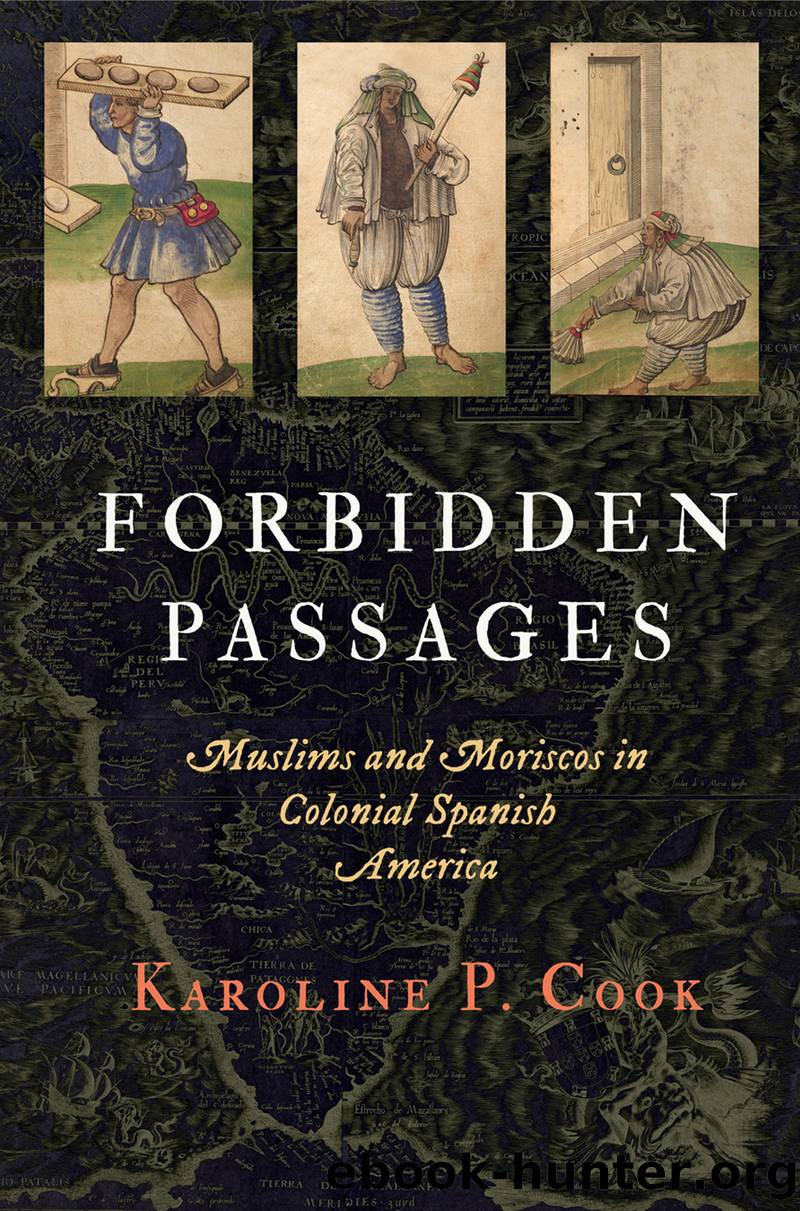Forbidden Passages by Karoline P. Cook

Author:Karoline P. Cook
Language: eng
Format: epub
Publisher: University of Pennsylvania Press, Inc.
Published: 2019-11-15T00:00:00+00:00
SUPERNATURAL REMEDIES FOR ILLNESS: MORISCO HEALERS
While official channels such as the Protomedicato were increasingly trying to regulate who could become a licensed physician in both Spain and Spanish America, residents of the viceroyalties of New Spain and Peru complained of the scarcity of doctors and the high cost of summoning them to their sickbed. Unregulated healers were much more attractive, being less expensive and more amenable to including in their cures religious elements that were also thought to influence individual bodies and health. Each community had slightly different prayers and figures to whom they appealed to cure illnesses, but over time they borrowed from each other.92
While old Christians may have doubted curanderos who failed to incorporate a proper dose of Catholic piety in their remedies, Moriscos in Spanish America may have sought the aid of healers whose cures they found familiar. For some, this created the opportunity to avoid the spiritual remedies forwarded by Catholic priests, surrounding sacraments such as the Eucharist.93 For others, the Christian-Muslim polemics, present in local knowledge, spurred denunciations even concerning a patientâs behavior on the sickbed. In this context, the sickbed came to be a place in which old Christians and Moriscos associated, at times sharing their expertise in medicine and at others encountering conflict.94 In 1624, when Gregorio Faxardo was ill in his hacienda of Santa Catalina near Sombrerete, in New Spain, he was asked to confess, take last rites, and pray for Godâs mercy for his sins. According to scandalized witnesses, âIn no way did he appear ⦠to do such a thing, or incline himself toward such acknowledgment that he should have as a Christian.â95 Finally, Faxardoâs doctor, Captain Diego de Bañuelos, summoned Friar Andrés de León to administer the sacraments to Faxardo, but that âbefore doing so, he [Faxardo] released a thousand oaths.â96 One of the witnesses, Miguel Sánchez Montión, took Faxardo to be a âbad Christianâ because of his blasphemies, and because he never saw him âpray outside the church, and [when he was] in it [it was] with poor example and little veneration.â97 Sánchez Montión also noted that once when Bañuelos was bleeding him, Faxardo exclaimed, âthis blood is Muslim, and on another occasion, many days later, he declared ⦠that his lineage and relatives ⦠descended from the Muslim kings of Granada.â98 If true, Faxardoâs claim to noble status and descent from prominent Granadan Muslim families is worth considering. It is interesting that Sánchez Montión chose to repeat this to inquisitors, as in Spain the claim to descent from the Granadan and Moroccan nobility brought with it a series of economic privileges and exemptions from the restrictions placed on the majority of the Morisco population.99 The claim would have its echoes in those of the indigenous nobility in New Spain and Peru, who assumed privileges under Spanish rule by highlighting their noble lineage predating Spanish arrival, and participation in the early conquests. Could this have been Faxardoâs attempt to defend himself against allegations of blasphemy?
Frustrated by the doctor
Download
This site does not store any files on its server. We only index and link to content provided by other sites. Please contact the content providers to delete copyright contents if any and email us, we'll remove relevant links or contents immediately.
| Americas | African Americans |
| Civil War | Colonial Period |
| Immigrants | Revolution & Founding |
| State & Local |
In Cold Blood by Truman Capote(3374)
The Innovators: How a Group of Hackers, Geniuses, and Geeks Created the Digital Revolution by Walter Isaacson(3146)
Steve Jobs by Walter Isaacson(2889)
All the President's Men by Carl Bernstein & Bob Woodward(2363)
Lonely Planet New York City by Lonely Planet(2217)
And the Band Played On by Randy Shilts(2197)
The Room Where It Happened by John Bolton;(2150)
The Poisoner's Handbook by Deborah Blum(2135)
The Innovators by Walter Isaacson(2098)
The Murder of Marilyn Monroe by Jay Margolis(2095)
Lincoln by David Herbert Donald(1982)
A Colony in a Nation by Chris Hayes(1927)
Being George Washington by Beck Glenn(1912)
Under the Banner of Heaven: A Story of Violent Faith by Jon Krakauer(1788)
Amelia Earhart by Doris L. Rich(1689)
The Unsettlers by Mark Sundeen(1682)
Dirt by Bill Buford(1670)
Birdmen by Lawrence Goldstone(1662)
Zeitoun by Dave Eggers(1643)
